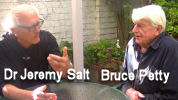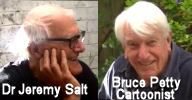Cartoonist Bruce Petty and Dr Jeremy Salt: Where news comes from: reporting on the Middle East
 Video and transcript inside. Second in series. First one, on Bashar al-Assad, is here. The third one is here. Australian cartoonist, Bruce Petty, & Dr Jeremy Salt, Middle East scholar and former journalist discuss news reporting on the Middle-East: Do we live with false assumptions? Bruce Petty and Dr Salt knew each other when they both worked for Australian newspapers and Bruce asks Jeremy for his recollections about mistakes in reporting on the Middle East. Jeremy Salt is the author of The Unmaking of the Middle East. A History of Western Disorder in Arab Lands, (University of California Press, 2008). Until recently, Dr Salt was based in the Department of Political Science and Public Administration, Bilkent University, Ankara, Turkey, where he ran courses in the history of the modern Middle East, in politics and in politics, propaganda and the media.
Video and transcript inside. Second in series. First one, on Bashar al-Assad, is here. The third one is here. Australian cartoonist, Bruce Petty, & Dr Jeremy Salt, Middle East scholar and former journalist discuss news reporting on the Middle-East: Do we live with false assumptions? Bruce Petty and Dr Salt knew each other when they both worked for Australian newspapers and Bruce asks Jeremy for his recollections about mistakes in reporting on the Middle East. Jeremy Salt is the author of The Unmaking of the Middle East. A History of Western Disorder in Arab Lands, (University of California Press, 2008). Until recently, Dr Salt was based in the Department of Political Science and Public Administration, Bilkent University, Ankara, Turkey, where he ran courses in the history of the modern Middle East, in politics and in politics, propaganda and the media.
The story behind these dialogues: On 16 November 2015 a small group of concerned Australian citizens got together to talk about the problems of getting real information out to Australians and other US-NATO allies about war in Syria, in spite of mainstream press efforts to confuse the public. Bruce Petty and Jeremy Salt were part of that group. Inside is the transcript of the embedded video. (There are two other videos in this series. The first is: "Cartoonist Bruce Petty asks Dr Jeremy Salt: Has Bashar al-Assad killed more people than ISIS? and similar questions". The second is: "Cartoonist Bruce Petty and Dr Jeremy Salt: Where news comes from: reporting on the Middle East."). The third is "Does Bashar al-Assad really have to go? Cartoonist Bruce Petty talks to Dr Jeremy Salt.")
Dialogue transcript
BRUCE PETTY: Ah well, Jeremy we should talk about where news comes from, whether it ever gets corrected, do we live with false assumptions? We both worked for The Age, we probably contributed to some … I certainly did as a cartoonist, contributed to some misunderstanding, or very sloppy history and analysis, because that’s what cartoonists do, fine tricks in the thing. You wrote about important subjects [JS: and edited], and edited. Do you recall some terrible errors we made in reporting the Middle-East?
JEREMY SALT: Well, I’ll tell you what, well, just apart from the Middle-East, I mean, I think cartoonists in a way it’s direct – you do the cartoon, you draw it, you give it to the picture editor or whatever, it goes to the newspaper. But news is an artefact, it’s fashioned, shaped, honed, it passes from one hand to the other, like the first step is: Who selects the news? The second step is: Who edits the news? The third step is: What they leave in, what they take out, OK? And so forth and so on – that’s a process. So what the person reads in the newspapers or sees on television is quite different from the raw material. And we both know the quantity of news that comes here to the daily newspaper or to a television station is enormous. The pictures as well, you know, so what they actually pick from that is a fraction of the total, you know, and that depends on the inclination, the temperament of the person who’s doing the choosing, alright? So the whole process is very contingent on a whole lot of things so when people look at a newspaper they don’t actually see what is behind it this immense three-dimensional world, alright. It really is like a beehive with lots of people labouring to produce this object called ‘news’.
BP: So it’s a sort of space problem in a way because you could analyse the moment, the moment that we’re discussing, which has come through from a correspondent or a consulate [Yes] but then somebody’s got to say, What are the origins of this puzzle that we’re looking at?
JS: Yeah, and someone’s got to make choices about, particularly on the editorial desk or subs’ desks, what you’re actually going to write, what you’re going to include. And I can remember I worked on The Age foreign desk and we’d get bundles of stuff in, we’d get a breaking story, you’d get a kind of a series of updates, leads, from morning to afternoon, OK? And you’d go through the file and you’d pick up what you thought were most important, and then you’d go through what you were getting from your own correspondent and often there’d be huge gaps, alright? Now if you tacked on what you’d got from the agency file to what the correspondent’s writing, you mightn’t like it, alright? It doesn’t fit into what he thinks the new situation is and you know, the editor might not like that. I mean I’ve been in that situation where Graham Perkin picked me up and said, I’ve had this message from so-and-so – I won’t tell you who it is – he went through this long letter, single spaced typed from one of our esteemed correspondents, single-spaced typing on three pages, and he says this and he says this, and he says this, and he says this, and he says, here I think we’ve got a left-wing saboteur on the subs’ desk.
BP: So, we’re going to lose readers if your piece goes in without …
JS: Well no, you, you’re going to get into trouble. [Oh OK, yeah.] If you tamper with the news like that, if you’re trying to present what you think – and of course your own judgement is just as suspect as anyone else’s – but if you try to present what … a balanced view, it might go against policy, it might go against the view of the correspondent, it can go against a whole lot of things. And you can get into trouble. You can get into strife over it.
BP: So obviously, a small magazine, not looking for great circulation will give you a better version of an incident or a situation than a big broadsheet with [inaudible] circulation.
JS: Probably, probably a small magazine has hundreds of people to write for it. They’re not going to pay. You know, if you don’t get your money, that’s fine. You’ve got to accept what you … [BP: Just write for a few people …] Yeah, but the newspapers have a line. Generally speaking they’ve got a line and there’s a whole lot of things that I’ve written for newspapers that have never seen the light of day, and this goes back many, many, many decades. And I think the reason would be that my view of the Middle-East, which is the area I do, is radical – in their view – or extreme. I had this experience with, actually, The Australian. I had a friend there and I wrote a piece on the peace process, so-called, all process, no peace. And this is about 1995, two years after it started, and I wrote a piece and sent it to The Australian. And occasionally I did, even though I don’t like The Australian. I’m sorry Bruce, I know it was your home for a while … and um, the person I sent it to, was on the Foreign Desk. He rang me and said, ‘We’re not going to run this’. He said, ‘I ran it past so-and-so’ and I said, ‘What did he say?’ ’Well, so-and-so said …’ and he stopped and I said ‘Said what, that I’m an extremist?’ and he said, ‘Yes, not to put too fine a point on it’. And so-and-so told me to tell you, that they will never run you on the Middle-East. Right? Right?
BP: So the Cold War was still operating.
JS: Well, we know The Australian’s editorial line is rightwing, OK? Sure, but even you know, mainstream papers like The Age or the SMH on certain issues are very conservative, on the Middle-East, most definitely.
JS: What I was writing in 1995 was that the so-called peace process between Israel and Palestine was finished, two years after [it began]. For me obviously, it was a waste of time, and that’s what they were not prepared to run. Of course, ten years later everyone’s saying it’s a joke, you know. But you know, extremists from their point of view.
JS: Bruce, did you ever have a cartoon rejected?
BP: Oh, not on political grounds and not international grounds, but ones that they didn’t like were anything corporate [OK, right] because they do our advertising [of course], we can’t live without them. So you don’t name anybody, you know you can do it in a general sense that they’re all, you know, pretty devious, but you can’t say, ‘Thisguy is a crook’.

 Bruce Petty is a highly regarded political satirist and cartoonist as well as an award-winning film maker. He went to Syria in 2009 (before the war) on a project to interview Syrian intellectuals and university students about their political views. Dr Jeremy Salt is a former journalist, turned academic and is the author of The Unmaking of the Middle East. A History of Western Disorder in Arab Lands, (University of California Press, 2008). Until recently, Dr Salt was based in the Department of Political Science and Public Administration, Bilkent University, Ankara, Turkey, where he ran courses in the history of the modern Middle East, in politics and in politics, propaganda and the media. The story behind this series: On 16 November 2015 a small group of concerned Australian citizens got together to talk about the problems of getting real information out to Australians and other US-NATO allies about war in Syria, in spite of mainstream press efforts to confuse the public. Bruce Petty and Jeremy Salt were part of that group. Inside is the transcript of the embedded video. (There are two other videos in this series:
Bruce Petty is a highly regarded political satirist and cartoonist as well as an award-winning film maker. He went to Syria in 2009 (before the war) on a project to interview Syrian intellectuals and university students about their political views. Dr Jeremy Salt is a former journalist, turned academic and is the author of The Unmaking of the Middle East. A History of Western Disorder in Arab Lands, (University of California Press, 2008). Until recently, Dr Salt was based in the Department of Political Science and Public Administration, Bilkent University, Ankara, Turkey, where he ran courses in the history of the modern Middle East, in politics and in politics, propaganda and the media. The story behind this series: On 16 November 2015 a small group of concerned Australian citizens got together to talk about the problems of getting real information out to Australians and other US-NATO allies about war in Syria, in spite of mainstream press efforts to confuse the public. Bruce Petty and Jeremy Salt were part of that group. Inside is the transcript of the embedded video. (There are two other videos in this series:
Recent comments